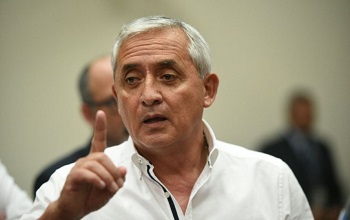Arrested former Guatemala President Otto Pérez Molina has professed his innocence in the corruption scandal that cost him the presidency, claiming that the US government influenced the investigation.
“I am innocent, and everyone must respect that,” the former president told the press following a March 28 court appearance, Prensa Libre reported.
It was Pérez’s first public appearance since he resigned the presidency in September 2015. Since then, he has been held in preventative detention at a military base.
Pérez was summoned to court alongside his former vice president, Roxana Baldetti, and approximately 30 other people accused of running a massive customs fraud network known as “La Línea.” The network allegedly embezzled millions of dollars in customs taxes.
SEE ALSO: Coverage of Elites and Organized Crime
The presiding judge was expected to rule on whether the case would go to trial, but instead he decided to indefinitely suspend proceedings in order to assess a petition from the Inspector General’s Office (Procuraduría General de la Nación – PGN), which requested to be included in the proceedings.
Before returning to the military base where he is being held, Pérez blamed the US Embassy for interfering in Guatemala’s internal affairs via anti-impunity commission the CICIG (Comisión Internacional Contra la Impunidad en Guatemala).
“Behind all this is the CICIG, which has become a tool for the United States,” Pérez stated.
The former president maintained that this was a case of “political persecution,” and that investigators lacked evidence.
The Attorney General’s Office has thousands of phone recordings allegedly proving the suspects’ involvement in the criminal network, along with testimony from former media mogul Salvador González, alias “Eco,” who reportedly helped administer La Línea’s illegal funds before becoming a witness for the prosecution.

Ex-President Otto Pérez Molina speaking to press, via Prensa Libre
InSight Crime Analysis
It is unsurprising that Pérez took this opportunity in the public eye to proclaim his innocence and try to depict the CICIG as unduly influenced by foreign powers.
Pérez’s relationship with the CICIG — which investigated La Línea along with the Attorney General’s Office — was not a fully cooperative one. In April 2015, Pérez reluctantly approved a two-year extension of the CICIG’s mandate, despite previous hints that he would not do so. This move was widely seen as the result of international pressure to keep the CICIG active in Guatemala.
SEE ALSO: Guatemala News and Profiles
While the CICIG and the Attorney General’s Office took the first groundbreaking steps in building a case against Pérez and Baldetti, it remains to be seen what will happen to the case if it goes to trial. In one famous case in 2013, Guatemala’s Constitutional Court annulled what had been the historical conviction of former dictator Efraín Ríos Montt on genocide charges, sparking international outrage.
While Pérez’s claims of US interference in Guatemala’s internal affairs carry much historical weight in the Latin American context, the head of the CICIG has previously assured that the US is “not propping up” the anti-impunity commission.
Nevertheless, concerns over sovereignty has limited efforts to create bodies similar to the CICIG elsewhere, in particular El Salvador.

